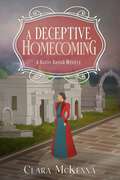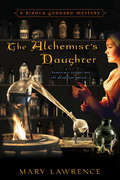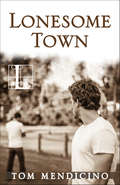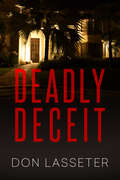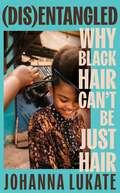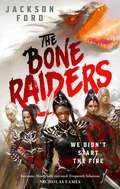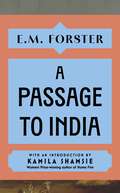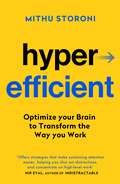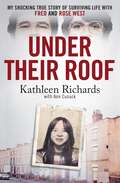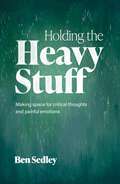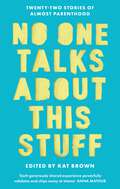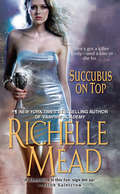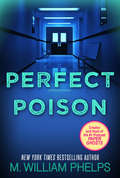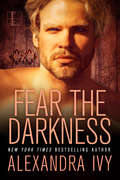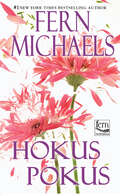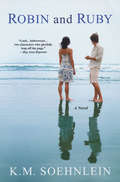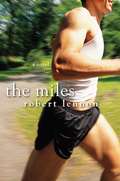- Table View
- List View
A Deceptive Homecoming: A Hattie Davish Mystery (A Hattie Davish Mystery #4)
by Clara McKennaTraveling secretary Hattie Davish is returning to her once-quiet hometown, where a deluge of deadly secrets leaves her feeling anything but welcome…When her good friend Virginia Hayward’s father passes away, Hattie Davish rushes to her hometown of St. Joseph, Missouri. She’s looking forward to visiting the place where she grew up, even if the circumstances bringing her there are bleak. But upon her arrival, she learns that all is not well in St. Joe. Virginia is cold and distant, Frank Hayward’s death is shrouded in mystery, and a string of troubling incidents have descended on Hattie’s alma mater, Mrs. Chaplin’s School for Women. Frank was the school’s bookkeeper, and as Hattie begins investigating the bizarre goings-on, she becomes convinced that someone other than Frank was in the casket—but who? Her search for the truth takes her from the town cemetery, to the home of an infamous outlaw, to the dungeon-like tunnels beneath the State Lunatic Asylum—and brings her face-to-face with a killer bent on the deadliest lesson of all…
The Alchemist's Daughter (A Bianca Goddard Mystery #1)
by Mary Lawrence&“Unique characters, a twisty plot and a bold, bright heroine . . . Mystery and Tudor fans alike will raise a glass to this new series.&”—Karen Harper, New York Times bestselling authorIn the year 1543 of King Henry VIII&’s turbulent reign, the daughter of a notorious alchemist finds herself suspected of cold-blooded murder . . . Bianca Goddard employs her knowledge of herbs and medicinal plants to concoct remedies for the disease-riddled poor in London&’s squalid Southwark slum. But when her friend Jolyn comes to her complaining of severe stomach pains, Bianca&’s prescription seems to kill her on the spot. Recovering from her shock, Bianca suspects Jolyn may have been poisoned before coming to her—but the local constable is not so easily convinced.To clear her name and keep her neck free of the gallows, Bianca must apply her knowledge of the healing arts to deduce exactly how her friend was murdered and by whom—before she herself falls victim to a similar fate . . .A Suspense Magazine Best Historical Mystery of the Year&“A realistic evocation of 16th century London&’s underside. The various strands of the plot are so skillfully plaited together.&”—Fiona Buckley, author of the Ursula Blanchard Mysteries &“The writing is terrific . . . will keep readers engaged until the very last page . . . a real page-turner.&”—San Francisco Book Review &“Whereas some historical fiction bristles with self-importance, this novel eschews it to excellent effect.&”—Library Journal
Lonesome Town
by Tom MendicinoCharlie Beresford and Kevin “KC” Conroy came of age in Tom Mendicino’s KC, At Bat and Travelin’ Man. Now they’re struggling with the realities of adulthood, in this powerfully honest story of unlikely friendship and enduring love.At twenty-two, Charlie Beresford has a Dartmouth degree, an entry-level radio job, and a hunch that he’s already made one of the biggest mistakes of his life. It’s no wonder his old high-school crush, KC Conroy, is wary when they encounter each other again. Five years ago, Charlie callously discarded him after they shared an intense adolescent affair. This KC is wiser and more worldly than the aspiring baseball star Charlie used to idolize. Back then, fame and success seemed a given. Now KC is chasing his last chance to make it as a pro, playing with an independent minor league team. But Charlie has changed too. Time and distance have taught him what’s worth fighting for, even when the odds are long—and that the only thing worse than striking out might be never taking a chance at all.
Deadly Deceit
by Don LasseterThe chilling true crime story of a man willing to do whatever it takes to live life on his lavish terms—including murder his own parents.Gunned DownAfter years of hard work, Brian and Jeannie Legg had earned a well-deserved life of leisure in their picture-perfect Phoenix mansion. Until their troubled son showed up with a need for cash—and a thirst for murder . . . Two BodiesDavid Legg was an obsessive control freak and an army deserter. After fathering an illegitimate child, he wooed and wed a trusting young woman—only to destroy his marriage with lies and infidelities. But his deceptions were far from over . . . A Savage SonIn June of 1996, Jeannie and Brian were found shot to death, their bodies sitting next to each other on their living room loveseat. Jeannie&’s expensive ring and the couple&’s credit cards were missing. Meanwhile, David, the prime suspect, was living it up in Hawaii with his fifteen-year-old girlfriend, draining his dead parents&’ savings through ATMs. After a long and costly chase this remorseless killer faced a jury of his peers in 2000, and was locked behind bars for life.
Access to History for the IB Diploma: The Cold War and the Americas 1945-1981 Second Edition
by Vivienne SandersA new edition for HL Option 2, History of the Americas, Topic 16: The Cold War and the Americas (1945-1981)The renowned IB Diploma History series, combining compelling narratives with academic rigor.An authoritative and engaging narrative, with the widest variety of sources at this level, helping students to develop their knowledge and analytical skills. This second edition provides:- Reliable, clear and in-depth narrative from topic experts - Analysis of the historiography surrounding key debates- Dedicated exam practice with model answers and practice questions- TOK support and Historical Investigation questions to help with all aspects of the Diploma
Access to History: The Unification of Italy 1789-1896 Fourth Edition
by Robert Pearce Andrina StilesExam Board: AQA, Edexcel, OCR & WJECLevel: A-levelSubject: HistoryFirst Teaching: September 2015First Exam: June 2016Give your students the best chance of success with this tried and tested series, combining in-depth analysis, engaging narrative and accessibility. Access to History is the most popular, trusted and wide-ranging series for A-level History students.This title:- Supports the content and assessment requirements of the 2015 A-level History specifications- Contains authoritative and engaging content- Includes thought-provoking key debates that examine the opposing views and approaches of historians- Provides exam-style questions and guidance for each relevant specification to help students understand how to apply what they have learntThis title is suitable for a variety of courses including:- Edexcel: The Unification of Italy, c1830-70- OCR: Italy and Unification 1789-1896
Disentangled: Why Black Hair Can't Be Just Hair
by Johanna LukateEven before we get to introduce ourselves by name, our hair has already started to tell stories about who we are, where we are from and where we are at. Our hair is tangled up in the interplay of race, gender, class, nationality, sexuality, power and beauty. It is an avid storyteller and a consummate performer - whether we like it or not. If our hair could talk, what stories would it tell about us?(Dis)entangled delves into the intricate and deeply personal relationship between Black individuals and their hair, exploring - through a collection of diverse experiences - the profound significance of hair as a conduit for self-expression, resilience, and collective memory within communities around the world. Each story illuminates the complex tapestry of experiences surrounding Black hair, shedding light on its intersections with gender, race and identity.Through the voices of those who have walked this textured path, the book ultimately seeks to empower readers to embrace their own unique journey of self-discovery, one strand at a time.
The Bone Raiders: The wild and exhilarating epic fantasy (The Rakada)
by Jackson Ford'AWESOME. MASTERFULLY EXECUTED. FREQUENTLY HILARIOUS' Nicholas Eames, author of Kings of the WyldThe start of an edge-of-your-seat, action‑packed epic fantasy series from the irreverent Jackson Ford, where a wild band known as the Bone Raiders harness the power of gigantic, fire-breathing lizards to defend their homeland.WE DIDN'T START THE FIRE . . . BUT OUR GIANT FIRE-BREATHING LIZARDS DID.You don't f*ck with the Rakada. The people living in the grasslands of the Tapestry call them the Bone Raiders, from their charming habit of displaying the bones of those they kill on their armour. But being a raider is tough these days. There's a new Great Khan in the Tapestry. He plans to use his sizeable military to get rid of the raider clans. And then there are the huge fire-breathing lizards that are straying into the grasslands a little too often these days.Sayana is a raider scout. She knows that to protect their way of life, she needs do something drastic. Like convincing her clan to ride those huge lizards, instead of horses. Sayana doesn't know how to do it without being eaten and/or cooked alive, but she'd better figure it out fast - or she and her clan, along with every other raider in the Tapestry, will be wiped out.'A ton of fun. The premise is awesome, the found-family dynamic is masterfully executed, the dialogue is wicked-sharp and frequently hilarious' Nicholas Eames, author of Kings of the Wyld'Ford begins this new series with quirky characters, loads of great action sequences, and his trademark brand of humour' Booklist'The Bone Raiders is a relentlessly cheeky, ofttimes unserious, and undisputedly rip-roaring bit of fantasy that can only be written by Jackson Ford. Badass female protagonists, found family, and giant lizards - what more do you need? Add this one to your TBR. I fully guarantee you'll be entertained' FanFiAddict
A Passage to India: With an introduction by Kamila Shamsie, Women's Prize-winning author of Home Fire
by E M ForsterForster's classic novel, with a new introduction by Kamila Shamsie, author of Home Fire, winner of the Women's Prize for Fiction'There's no writer better than Forster at portraying the genuine feelings that are born from the interaction between one human being and another'KAMILA SHAMSIE'Forster's last and greatest novel'DAMON GALGUT, GUARDIAN'His great book . . . masterly in its prescience and its lucidity'ANITA DESAI'The first time I saw you, you were wanting to see India, not Indians, and it occurred to me: Ah, that won't take us far.'The Indian town of Chandrapore seems to change dramatically season by season, day by day, offering different impressions from each angle it is viewed. Vulnerable to flooding, but blessed by glorious sun, it is surrounded by vast, flat expanses, except for hills to the south that house the extraordinary Marabar Caves.When Mrs Moore and her younger travelling companion Adela arrive in town, they are frustrated and disappointed that all they can find is the claustrophobia of British colonial culture. Then a chance meeting with the charming and well-respected Dr Aziz seems to present the perfect opportunity to fulfil their desire to see the 'real India'. But during a guided tour of the Marabar Caves, a strange incident occurs, resulting in a shocking accusation that throws Chandrapore into a fever of racial tension and the doctor straight into the heart of a scandal from which he might never recover.
Hyperefficient: Simple Methods to Optimise your Brain and Transform the Way you Work
by Mithu Storoni'Read this book! Mithu Storoni's unique strategy doesn't just preserve brain health and longevity, it promises to escalate mental performance to new heights and improve the way we work.' - Dan Buettner, National Geographic Fellow and #1 New York Times Bestselling author of the Blue Zones.Take back control. Optimize your brain. Become hyperefficient.In today's digital age, we move through life at a frantic pace to keep up with the never-ending influx of information and daily tasks. But what if some simple shifts could help boost creativity and optimise how we focus and process data, to elevate our mental performance and productivity?In Hyperefficient, Dr Mithu Storoni lays out the tools to retune our brains to the best settings for complex thinking, concentration, and decision-making. Storoni proposes we impose the rhythm of our brains on our work in order to create the perfect environment for us to thrive individually at work and at home. Rooted in the very latest scientific research, Hyperefficient is a must-have practical manual for your brain.
Under Their Roof: My shocking true story of surviving serial killers Fred and Rose West
by Kathleen Richards Ann Cusack'My stomach was clenched tight. I knew there was no way I could swallow a single morsel. Playing in my mind was a slideshow of evil, fragments of memory, glued together by fear: Fred and Rose West dragging me off the pavement, Fred pinning me on the sofa while Rose stroked my hair, Fred climbing into my bed and assaulting me while I slept...'Kathleen Richards was just 17 when she and her sister Deirdre found themselves on the doorstep of 25 Cromwell Street, Gloucester, seeking lodgings from a seemingly friendly local couple: Fred and Rose West.While growing up in poverty-stricken Dublin in the 1960s, Kathleen was abused from a young age. A move to England allowed her to escape, but even so life remained difficult, forcing her to seek refuge.At first, Cromwell Street provided freedom for the sisters who were entertained by Fred's quirky behaviour. Kathleen was also happy to make a new friend in her fellow lodger, Shirley Robinson.But then, things took a sinister turn: Fred began to abuse Kathleen with his wife's encouragement. And, when Shirley suddenly disappeared too, Kathleen's world began to grow very dark... This is a chilling account of what it's like to come face-to-face with Britain's most notorious serial killers, but it is also an inspiring account of the resilience of women and how to find happiness after trauma.
Holding the Heavy Stuff: Making Space for Critical Thoughts and Painful Emotions
by Ben SedleyHolding the Heavy Stuff is a unique, illustrated self-help guide for anyone who has struggled with low mood, worries, self-doubts or mean thoughts about themselves and then found it difficult to move their life forward.It is for people who feel overwhelmed or consumed by worries about the future, or find themselves stuck reliving moments from their past.It is for those who have days, weeks or months when sadness takes over and getting through each hour feels challenging.It is for those who can't imagine life getting better as the world gets worse.It is for people who feel dumped on or knocked off track.It is for all of us who face tragedy and difficulty and feel weighed down.Perhaps you struggle to live the life you want or are holding too much heavy stuff. The more you try to fight this internal pain, the more you have it. Instead of struggling against it, this book offers a different approach. You will learn ways to carry the heavy stuff with you as you go where you want to go.
No One Talks About This Stuff: Twenty-Two Stories of Almost Parenthood
by Kat BrownNo One Talks About This Stuff is a support group for almost-parents. A place to share their journeys of loss and limbo, to confront social pressure and to find courage in the darkness of tragedies which happen every day yet are brushed under the carpet. So, we hear from a stepmother who wrestles with infertility. A husband and wife each tell their experience of losing their baby. A lesbian comes of age at a time when gay people rarely become parents. A father finds loss to be his unlikely superpower. Complex post-traumatic stress disorder impacts a person's choices about having a family. A black woman unpacks ancestral shame while finding renewed purpose. And each person shares how they lived through it. This captivatingly beautiful, profound and honest anthology opens a much-needed conversation about society, family and honouring the missing children we will never forget.
Waterborne
by Katherine IronsKatherine Irons returns to a world so close yet so far away, where beauty, desire, danger and deception await. . .A Force Of NatureRee O'Connor is more than she seems to be. Despite her delicate appearance and her broken heart, she sees what others don't. In fact, she is an agent of a clandestine world court, about to bring down a monster when a stranger springs her trap instead. The mistake nearly costs Ree not only her prey, but her life, too--until mysterious Alexandros spirits her to an underwater world she never suspected, even with all her secret knowledge. As a prince of Atlantis, Alexandros has centuries of experience in love and battle. His magic draws from the power of the ocean itself, and he can be just as beguiling--and just as unfathomable. Could any man heal Ree enough to become more than a sometime lover? And can she trust her heart to a soldier-prince of the deep? Praise for Seaborne"An enchanting tale that's to be savored." --Romantic Times"A page-turning tale of forbidden love and ocean magic. . .it swept me away! --Sarah Grey"A wonderful under the sea tour." --Genre Go Round Reviews
Succubus On Top (Georgina Kincaid #2)
by Richelle MeadA succubus must balance a burgeoning romance as she fights to save a co-worker&’s soul in this urban fantasy from a #1 New York Times–bestselling author. Love hurts, and no one knows it better than Georgina Kincaid. If she so much as kisses Seth Mortensen, the shy, sexy writer she&’s been dating, she&’ll drain his life force. Admittedly, the shapeshifting and immortality perks of a succubus are terrific, but it&’s completely unfair that a she-demon whose purpose is seduction can&’t get down with the one mortal who accepts her for who she is… It&’s not just her personal life that&’s in chaos. Doug, Georgina&’s co-worker at a local bookstore, has been exhibiting bizarre behavior, and Georgina suspects something far more demonic than double espressos. She could use an assist from Bastien, an irresistibly charming incubus and her best immortal friend, but he&’s giving Georgina some highly distracting come-hither vibes. Georgina is going to have to work solo on this one-and fast, because soon, Doug&’s life won't be the only one on the line…Praise for Richelle Mead and her Succubus series&“Richelle Mead delivers sexy action and tongue-in-cheek hellish humor—if damnation is this fun, sign me up!&”—Lilith Saintcrow, author of The Devil's Right Hand &“This is one of those series I'm going to keep following.&”—Jim Butcher, New York Times bestselling author of the Harry Dresden series &“The mix of supernatural mystery, romance, and reluctant succubus is great fun.&”—Locus &“Mead cooks up an appetizing debut that blends romantic suspense with a fresh twist on the paranormal, accented with eroticism.&”—Booklist
Midnight Wrangler (Midnight Cowboys #2)
by Cat JohnsonA second chance with an old flame lights a fire under a widowed rancher in this contemporary western romance by the bestselling author of Midnight Ride.One lonely widower . . . Rohn Lerner is a successful Oklahoma rancher. He's old enough to know what he likes, and still young enough to enjoy it. But losing his wife five years ago wore him thin. He&’s not ready to date, but he needs someone to share a meal with as badly as someone to warm his bed.One woman with a secret . . . Bonnie Martin fled her Oklahoma home years ago, leaving behind her abusive father, and Rohn, the lost love she never forgot. Now she&’s back to settle her father's estate, but she has no idea that she's about to bump into Rohn or that they&’ll fall for each other all over again.One night that changes everything . . . Praise for Midnight Wrangler &“Johnson . . . sensitively paints a sweet and sizzling contemporary romance&” —Publishers Weekly, Starred Review &“A moving story about second chances and rediscovered love that will delight fans&” —RT Book Reviews
Perfect Poison: A Female Serial Killer's Deadly Medicine
by M. William PhelpsThe true-crime story of a Massachusetts nurse with a dark secret, by the New York Times bestselling author of The Girl Left Behind.At the Veterans Affairs Medical Center in Northampton, Massachusetts, Kristen Gilbert was known as a hardworking, dedicated nurse. Yet so many emergencies and sudden deaths occurred under Kristen's watch that others jokingly called her the “Angel of Death.” No one suspected the horrifying truth: that over the course of six months, Gilbert had caused the deaths of as many as forty patients. With new insight into the sociopathic mindset of nurses who kill, and the latest details on Gilbert's ongoing prison sentence, M. William Phelps exposes how one person's good intentions went so chillingly, killingly wrong . . .Praise for Perfect Poison“True crime at its best—compelling, gripping, an edge-of-the-seat thriller. Phelps packs wallops of delight with his skillful ability to narrate a suspenseful story.” —Harvey Rachlin, award-winning author of Song and System“A compelling account of terror . . . the author dedicates himself to unmasking the psychopath with facts, insight, and the other proven methods of journalistic leg work.” —Lowell Cauffiel, New York Times bestselling author of House of SecretsIncludes sixteen pages of dramatic photos
On the Hunt (The Sentinels)
by Alexandra Ivy Rebecca Zanetti Hannah Jayne Dianne DuvallFour of today&’s most intriguing paranormal authors entice readers deep into the shadows, where vampires, immortals, and other supernatural creatures heat up the night... On The Hunt by Alexandra IvyMika Tanner has loved Bailey Morrell, a beautiful Healer, since childhood. But his duty as a Sentinel, a supernatural guardian of an ancient race, clashed with her rebellious spirit. Now a dangerous new anarchist group not only threatens life as they know it—but any chance of their being together again...Scorpius Rising by Rebecca ZanettiWith a deadly disease spreading like wildfire across the country, microbiologist Nora Medina needs to focus all her energy on stopping the pandemic. Playing with dynamite—in the form of her way-too-hot ex—is the last thing she should be doing. But forced to work with Deacan McDougall against unexpected enemies with the seconds ticking by, she knows the explosion is coming...Phantom Embrace by Dianne DuvallImmortal Yuri Sokolov was born with the ability to see spirits, yet he's never seen one as lovely as Cat Seddon, the woman who haunts his home and his dreams. But amid their star-crossed love, a new danger may have Yuri facing a different kind of eternity.Stake Out by Hannah JayneVampire fashion designer Nina LaShay has a lot on her plate—just two days until fashion week and the model who was flirting with her photographer boyfriend is now a corpse in her studio. But when dead turns into undead and dangerous, Nina must find out who&’s responsible…before the beautiful baby vamp takes too many bites out of the Big Apple.
Fear the Darkness (Guardians of Eternity #9)
by Alexandra IvyA beautiful werewolf and her ferocious protector face deadly enemies and dark desires in a supernatural romance by the New York Times bestselling author. Cassie is a werewolf prophet blessed with visions that portend the fate of the world. A rare and delicate creature, she must be protected at all costs. Enter Caine, a powerful cur turned pureblooded Were whose recent tangles with a demon lord have left him in serious need of redemption. Caine is duty-bound to keep Cassie out of danger—and that includes resisting his potent urge to seduce her. As Cassie's mysterious visions lead them in and out of danger, Caine becomes increasingly certain that he has found his true mate. Cassie is charmed and frightened by Caine's magnetism. But she can't afford to doubt Caine now. A deadly enemy bent on destruction is closer than they realize—and only they can keep chaos from ruling the world.
The Nightingale
by Morgana GallawayEvery day Leila al-Ghani spends in Mosul is a reminder of what her life once was. Before the war, she was the daughter of one of the city's finest families. She was encouraged by her parents to get an education, to think like a modern woman. But now, with Mosul crumbling around her, she is expected to strictly adhere to traditions, to dress modestly with the hijab covering her hair, and to be arranged in marriage. Disobeying her domineering father and secretly taking a job as a translator at an American military base, Leila's beliefs are forever challenged when she meets a host of new people with different perspectives on the war--and the world. But it is Leila's friendship with Major James Cartwright that will test her courage in profound ways. And when she discovers those she loves are deeply entangled in the most violent, controversial aspects of the war, where she places her loyalties could cost Leila her life. The Nightingale is a riveting debut that offers a rare glimpse into war-torn Iraq--where a spirited young woman must choose between honoring the customs of the past and her own hopes for the future. . . "Morgana Gallaway has crafted a powerful story of one Iraqi woman's fight to keep her dreams alive even as her family, hometown, and country are being destroyed. There's a lot of truth in this work of fiction." --Laura Fitzgerald, author of Veil of Roses "Gallaway's debut deftly captures a young woman's lonely battle for survival in a family and country abruptly shattered by war. The Nightingale is a poignant tale of family loyalty, taboo love and the ravages of war." --Shobhan Bantwal, author of The Dowry Bride
When We Touch (A\graham Novel Ser.)
by Heather GrahamA sensible betrothal leads to secret passion discovered in the dangerous streets of London in the New York Times bestselling author&’s Victorian romance. Queen Victoria&’s London is a teeming metropolis of pageantry, forbidden desire, and danger—especially in the East End, where a mysterious murderer preys on ladies of the night. What widow Lady Maggie Graham does there provides plenty of grist for the rumor mill. When she agrees to wed the much older Viscount Langdon, there are those who suspect bad intentions—including the man&’s nephew, Lord Jamie . . . Experience has taught Lord Jamie well. He has seen his fair share of women behaving inappropriately—enjoying risqué amusements in secret theatres, running about disguised in the seediest parts of the city. Then they call you vile names for coming to their rescue. And no woman is more shameless, more cunning, more intoxicating than Lady Maggie . . . Praise for Heather Graham &“A master of her craft." —RT Book Reviews &“An incredible storyteller.&” —Los Angeles Daily News &“Heather Graham sparkles!&” —Kat Martin, New York Times bestselling author
Hokus Pokus (Sisterhood #9)
by Fern MichaelsNot Even An Ocean Can Keep The Sisterhood From Helping A Friend In Need. . .There is no match for the Sisterhood--the seven friends who have taken vigilante justice to a new level--not even the Federal Bureau of Investigation. Although the women foiled former FBI director Mitch Riley's plot to frame their friends Judge Nellie Easter and lawyer Lizzie Fox, now they must remain in exile or risk capture. They can't complain about their opulent digs on a remote, luxurious mountaintop, but the ladies desperately miss home. Their wish to return might come true sooner than they expect when they receive a panicked call from Supreme Court Chief Justice Pearl Barnes, who faces blackmail for her own illegal brand of justice. Now the women must not only sneak back into the United States, but also remain undetected as they investigate. But how do you make seven women disappear? With a nosy reporter on the brink of exposing them, the clock is ticking as the Sisterhood tries to create a little magic--and save the day. . .Praise for Fern Michaels and her Sisterhood novels. . ."Revenge is a dish best served with cloth napkins and floral centerpieces. . .fast-paced. . .puts poetic justice first." --Publishers Weekly on Payback"An unforgettable story." --Rendezvous on Weekend Warriors
Robin and Ruby
by K.M. SoehnleinAt twenty-years-old, Robin MacKenzie is waiting for his life to start. Waiting until his summer working at a Philly restaurant is over and he's back with his boyfriend Peter. . .until the spring semester when he'll travel to London for an acting program. . .until the moment when the confidence he fakes starts to feel real."Engaging. . .capturing intimately the mood of the period." –Publishers WeeklyThen, one hot June weekend, Robin gets dumped by his boyfriend and quickly hits the road with his best friend George to find his teenaged sister, Ruby, who's vanished from a party at the Jersey Shore. "A fresh, eloquent perspective to the oft-writ story of sexual and romantic coming of age." –Book MarksBut Ruby is on an adventure of her own, dressing in black, declaring herself an atheist, pulling away from the boyfriend she doesn't love--not the way she loves the bands whose fractured songs are the soundtrack to her life. Then a chance encounter puts Ruby in pursuit of a seductive but troubled boy who might be the key to her happiness, or a disaster waiting to happen. Now as their paths converge, Ruby and Robin will confront the sadness of their shared past and rebuild the bonds that still run deep. . ."Lush. . .bittersweet. . .two characters who gleefully leap off the page." –Bay Area Reporter
The Eternal Engagement
by Mary B. Morrison"Betrayal, greed, and sex." --Publishers WeeklyNew York Times bestselling author Mary B. Morrison's thrilling tale of a love triangle, lives at a crossroads, and the price of secrets. . .After her high school sweetheart joined the military, Mona Lisa Ellington thought she'd never love again. So she settled for a man who cherished her--and made his living hurting others. Yet she prayed her fiancé would one day return. Mona Lisa's classmate, Katherine Clinton, knew she'd marry her high school sweetheart and live happily ever after. But when he left for the military, she had to make new plans for her and their son. Still, Katherine dreamed of the day her fiancé would return. William Lincoln joined the military to make his grandfather proud. He never imagined he would be gone so long. Or that his selfish proposal to two women would be the least of his problems. . .because all three would soon face the consequences of too much deception.. . . "Mix dirty red drama, relationship scandals, suspense, love and you get my girl Mary B. Morrison." --Vickie Stringer
The Miles
by Robert LennonA squadron of spectators screamed and hooted, and Liam could feel his legs lighten. It was possible. He could run at any speed now; he would accelerate and accelerate and accelerate. . .When Liam Walker joins a running club in New York City, it's with some trepidation. Liam has always loved running, but the world of team racing, and the camaraderie that goes with it, are new to him. Still, after years of stagnancy--working for the same magazine, living in the same apartment, and jumping from one short-term boyfriend to another--he's ready to try. At the club, Liam meets athletes of every stripe. Some are fiercely competitive, others more interested in the after-race bagels or team nights out partying. The revelations on the track hardly compare to what happens off it--the romance and heartaches, rivalries and injuries. And as the year unfurls leading to the ultimate challenge--the New York City Marathon--Liam starts to realize all the ways in which life is measured by hills and valleys, in how far you're willing to push yourself, and in who's waiting for you at the finish line. . .Robert Lennon works in corporate business development at a large global law firm and is a former president of Front Runners New York--one of the largest LGBT athletic clubs in the world. A former journalist for The American Lawyer magazine, Rob spends much of his time writing. As an avid runner who has completed the NYC marathon five times, Rob fuses his talents as a writer and a runner through this work. Rob has a Master's Degree in Journalism from Columbia University and a BA in History and Psychology from Duke University. He lives in Connecticut with his partner, Mark, and their twin sons.
